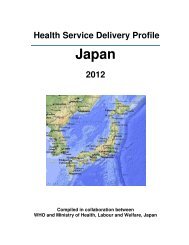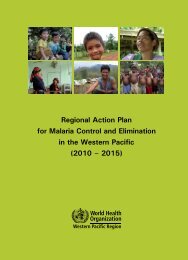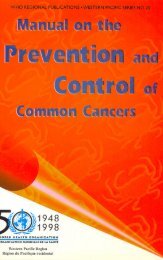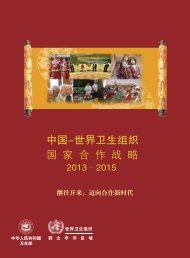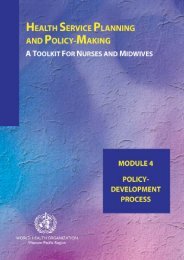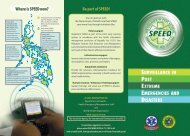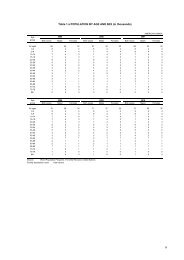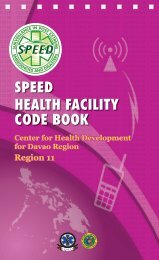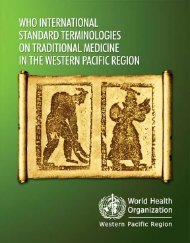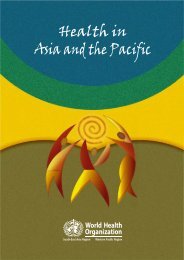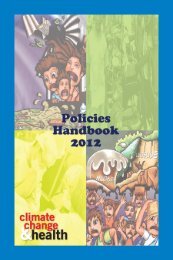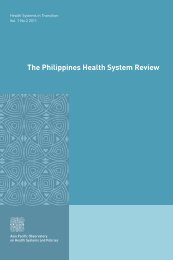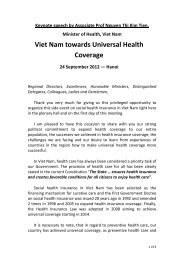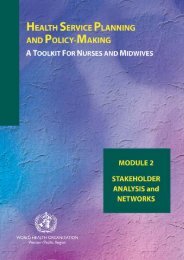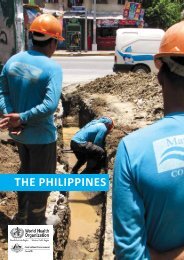monitoring of the who global code of practice on the international ...
monitoring of the who global code of practice on the international ...
monitoring of the who global code of practice on the international ...
You also want an ePaper? Increase the reach of your titles
YUMPU automatically turns print PDFs into web optimized ePapers that Google loves.
MULTISTAKEHOLDER PERSPECTIVES ON MONITORING THE CODE<br />
The five groups <str<strong>on</strong>g>of</str<strong>on</strong>g> stakeholders (government, hospitals; pr<str<strong>on</strong>g>of</str<strong>on</strong>g>essi<strong>on</strong>al associati<strong>on</strong>s;<br />
recruitment agencies; and trade uni<strong>on</strong>s) used a mix <str<strong>on</strong>g>of</str<strong>on</strong>g> methods, particularly key informant<br />
interviews, document review (policy instruments cited), and observati<strong>on</strong> through <str<strong>on</strong>g>the</str<strong>on</strong>g>ir<br />
various engagements.<br />
This secti<strong>on</strong> presents <str<strong>on</strong>g>the</str<strong>on</strong>g> resp<strong>on</strong>ses <str<strong>on</strong>g>of</str<strong>on</strong>g> <str<strong>on</strong>g>the</str<strong>on</strong>g> stakeholders and emerging general patterns with<br />
regards to <str<strong>on</strong>g>the</str<strong>on</strong>g> implementati<strong>on</strong> <str<strong>on</strong>g>of</str<strong>on</strong>g> <str<strong>on</strong>g>the</str<strong>on</strong>g> WHO Code in <str<strong>on</strong>g>the</str<strong>on</strong>g> Philippines. The informati<strong>on</strong> is<br />
organized in such a manner that it follows <str<strong>on</strong>g>the</str<strong>on</strong>g> series <str<strong>on</strong>g>of</str<strong>on</strong>g> questi<strong>on</strong>s included in <str<strong>on</strong>g>the</str<strong>on</strong>g> WHO<br />
Nati<strong>on</strong>al Reporting instrument.<br />
1. Legal rights and resp<strong>on</strong>sibilities <str<strong>on</strong>g>of</str<strong>on</strong>g> equally qualified and experienced<br />
migrant health pers<strong>on</strong>nel and domestically trained health workforce in<br />
terms <str<strong>on</strong>g>of</str<strong>on</strong>g> employment and c<strong>on</strong>diti<strong>on</strong>s <str<strong>on</strong>g>of</str<strong>on</strong>g> work.<br />
In resp<strong>on</strong>ding to <str<strong>on</strong>g>the</str<strong>on</strong>g> WHO reporting instrument, <str<strong>on</strong>g>the</str<strong>on</strong>g> Philippines defined <str<strong>on</strong>g>the</str<strong>on</strong>g> migrant health<br />
pers<strong>on</strong>nel as <strong>on</strong>e <str<strong>on</strong>g>who</str<strong>on</strong>g> has last held employment in a foreign country or <str<strong>on</strong>g>who</str<strong>on</strong>g>se qualificati<strong>on</strong><br />
for employment was obtained in a foreign country. The Philippines is c<strong>on</strong>sidered as a source<br />
country <str<strong>on</strong>g>of</str<strong>on</strong>g> migrant health pers<strong>on</strong>nel. It is not c<strong>on</strong>sidered yet as a destinati<strong>on</strong> country for<br />
migrant health pers<strong>on</strong>nel. Hence, <str<strong>on</strong>g>the</str<strong>on</strong>g> matter <str<strong>on</strong>g>of</str<strong>on</strong>g> “equality in <str<strong>on</strong>g>the</str<strong>on</strong>g> legal rights and<br />
resp<strong>on</strong>sibilities <str<strong>on</strong>g>of</str<strong>on</strong>g> qualified and experienced migrant health pers<strong>on</strong>nel and domestically<br />
trained health workforce in terms <str<strong>on</strong>g>of</str<strong>on</strong>g> employment c<strong>on</strong>diti<strong>on</strong>s <str<strong>on</strong>g>of</str<strong>on</strong>g> work”, is not applicable to<br />
<str<strong>on</strong>g>the</str<strong>on</strong>g> current Philippine situati<strong>on</strong>.<br />
The government agencies am<strong>on</strong>g <str<strong>on</strong>g>the</str<strong>on</strong>g> members <str<strong>on</strong>g>of</str<strong>on</strong>g> HRH Network Philippines clarified <str<strong>on</strong>g>the</str<strong>on</strong>g><br />
Philippine situati<strong>on</strong> regarding <str<strong>on</strong>g>the</str<strong>on</strong>g> legal rights and resp<strong>on</strong>sibilities <str<strong>on</strong>g>of</str<strong>on</strong>g> equally qualified and<br />
experienced migrant health pers<strong>on</strong>nel vis-‐a-‐vis Filipino health pr<str<strong>on</strong>g>of</str<strong>on</strong>g>essi<strong>on</strong>als in <str<strong>on</strong>g>the</str<strong>on</strong>g><br />
Philippines. Though <str<strong>on</strong>g>the</str<strong>on</strong>g> Philippines is signatory to <str<strong>on</strong>g>the</str<strong>on</strong>g> ASEAN Mutual Recogniti<strong>on</strong><br />
Arrangements (MRArs) <strong>on</strong> Medical Practiti<strong>on</strong>ers (2009), <strong>on</strong> Dental Practiti<strong>on</strong>ers (2009), and<br />
<strong>on</strong> Nursing Services (2006), such regi<strong>on</strong>al arrangements have not been implemented to<br />
allow <str<strong>on</strong>g>the</str<strong>on</strong>g> entry into <str<strong>on</strong>g>the</str<strong>on</strong>g> Philippines <str<strong>on</strong>g>of</str<strong>on</strong>g> foreign migrant health workers.<br />
The 1987 Philippine C<strong>on</strong>stituti<strong>on</strong> provides for <str<strong>on</strong>g>the</str<strong>on</strong>g> “sustained development <str<strong>on</strong>g>of</str<strong>on</strong>g> a reservoir <str<strong>on</strong>g>of</str<strong>on</strong>g><br />
nati<strong>on</strong>al talents...”, <str<strong>on</strong>g>who</str<strong>on</strong>g>se <str<strong>on</strong>g>practice</str<strong>on</strong>g> in <str<strong>on</strong>g>the</str<strong>on</strong>g> Philippines has been limited to Filipino citizens in<br />
22 health pr<str<strong>on</strong>g>of</str<strong>on</strong>g>essi<strong>on</strong>s and sub pr<str<strong>on</strong>g>of</str<strong>on</strong>g>essi<strong>on</strong>s, including medicine, allied pr<str<strong>on</strong>g>of</str<strong>on</strong>g>essi<strong>on</strong>s, medical<br />
technology, midwifery, nursing, nutriti<strong>on</strong> and dietetics, optometry, pharmacy, physical and<br />
occupati<strong>on</strong>al <str<strong>on</strong>g>the</str<strong>on</strong>g>rapy, radiologic and x-‐ray technology, and veterinary medicine (1987<br />
Philippine C<strong>on</strong>stituti<strong>on</strong> Article XII Secti<strong>on</strong>s 10 and 14; Executive Order No. 584).<br />
The access <str<strong>on</strong>g>of</str<strong>on</strong>g> foreign workers to <str<strong>on</strong>g>the</str<strong>on</strong>g> labour market is covered by <str<strong>on</strong>g>the</str<strong>on</strong>g> Labor Code as<br />
amended (Article 40 referring to <str<strong>on</strong>g>the</str<strong>on</strong>g> employment permit <str<strong>on</strong>g>of</str<strong>on</strong>g>n<strong>on</strong>-‐resident aliens). 2 The health<br />
migrant’s right to be a member <str<strong>on</strong>g>of</str<strong>on</strong>g> labor organizati<strong>on</strong>s varies am<strong>on</strong>g countries; some allow<br />
membership as in <str<strong>on</strong>g>the</str<strong>on</strong>g> case <str<strong>on</strong>g>of</str<strong>on</strong>g> <str<strong>on</strong>g>the</str<strong>on</strong>g> United States as a receiving country, in some cases<br />
2 Article 40 <str<strong>on</strong>g>of</str<strong>on</strong>g> <str<strong>on</strong>g>the</str<strong>on</strong>g> Labor Code – Employment permit <str<strong>on</strong>g>of</str<strong>on</strong>g> n<strong>on</strong>-‐resident aliens.<br />
http://www.chanrobles.com/legal4labor1.htm<br />
7



